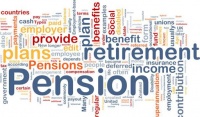Difference between revisions of "LGBTQ Experts on Pensions and Retirement"
| (One intermediate revision by the same user not shown) | |||
| Line 5: | Line 5: | ||
In most countries, LGBTQ individuals are denied the benefits of their partners' pensions. Even in countries that have equal marriage rights, pension law often lags on benefits. For example, it was not until the Supreme Court of the United Kingdom ruled unanimously in favour of activist [[John Walker]] that government pension benefits were bestowed to same-sex partners. In the United States, a recent survey shows that only 56 per cent of companies that offer survivor annuities to their employees extend the benefit to same-sex partners. | In most countries, LGBTQ individuals are denied the benefits of their partners' pensions. Even in countries that have equal marriage rights, pension law often lags on benefits. For example, it was not until the Supreme Court of the United Kingdom ruled unanimously in favour of activist [[John Walker]] that government pension benefits were bestowed to same-sex partners. In the United States, a recent survey shows that only 56 per cent of companies that offer survivor annuities to their employees extend the benefit to same-sex partners. | ||
| − | This, of course, puts elderly LGBTQ individuals at greater risk than their heterosexual contemporaries. Many elders rely on family members or friends to support | + | This, of course, puts elderly LGBTQ individuals at greater risk than their heterosexual contemporaries. Many LGBTQ elders rely on family members or friends to support them in retirement because they do not have children to care for them. This is on top of the discrimination they face in retirement homes and society. Differences in family |
| − | circumstances, challenges in the workplace and health issues lead to greater vulnerability among LGBT people. | + | circumstances, challenges in the workplace and health issues lead to greater vulnerability among LGBT retired people. |
| − | Governments all have a role to play in supporting healthy aging and long-term financial security for all. In addition to government, however, | + | Governments all have a role to play in supporting healthy aging and long-term financial security for all. In addition to government, however, there is a growing group of LGBTQ individuals who are active in the field of pensions and retirement. We have been able to identify the following individuals from various countries. |
Latest revision as of 01:49, 22 March 2021
Pensions provide a secure source of retirement income for individuals and their families. This is equally true for LGBTQ individuals, their partners and families. Individuals work hard at their profession during their working lives. They save for their retirement and contribute taxes to state-supported retirement plans. This is as true for LGBTQ individuals as it is for any other in a society.
In most countries, LGBTQ individuals are denied the benefits of their partners' pensions. Even in countries that have equal marriage rights, pension law often lags on benefits. For example, it was not until the Supreme Court of the United Kingdom ruled unanimously in favour of activist John Walker that government pension benefits were bestowed to same-sex partners. In the United States, a recent survey shows that only 56 per cent of companies that offer survivor annuities to their employees extend the benefit to same-sex partners.
This, of course, puts elderly LGBTQ individuals at greater risk than their heterosexual contemporaries. Many LGBTQ elders rely on family members or friends to support them in retirement because they do not have children to care for them. This is on top of the discrimination they face in retirement homes and society. Differences in family circumstances, challenges in the workplace and health issues lead to greater vulnerability among LGBT retired people.
Governments all have a role to play in supporting healthy aging and long-term financial security for all. In addition to government, however, there is a growing group of LGBTQ individuals who are active in the field of pensions and retirement. We have been able to identify the following individuals from various countries.
Australia
- Neal Blewett, Minister for Social Security
- Cathy Eccles, Blue Cross retirement home company
- Peter Robinson, academic
- Anthony Wood, pension lawyer
Canada
- Andrew Dale, OMERS pension fund
- Susan Ursel, pension law expert
Great Britain
- Nick Brown, Minister of State for Work and Pensions
- Angela Eagle, Minister of State for Pensions and Ageing Society
- Daniel Gerring, pension lawyer
- Debbie Gupta, management at National Employment Savings Trust (NEST)
- Nancy Kelley, Department for Work and Pensions
- Lee Marshall, Church of England Pension Board
- Liz Sayce, Social Security Advisory Committee
- John Walker, activist
Scotland
- Jeane Freeman, Minister of Social Security
Switzerland
- Daniel Stolz, Committee for Social Security and Health
United States
- Ivy Bottini, activist
- David Johns, advisor to the Senate Committee on Health, Education, Labor and Pensions

